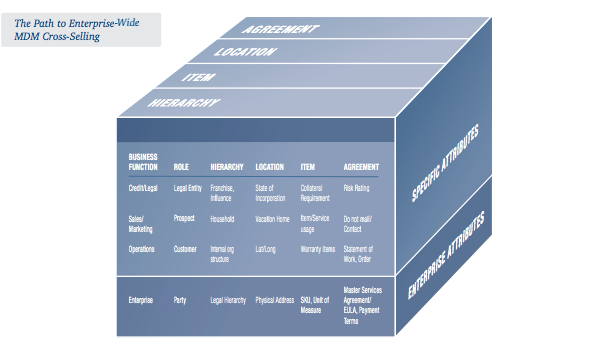Cross-Selling In the Industrial Machinery and Equipment Sector
More and more, our clients are finding that data can help them to identify new products to invest in while also helping to improve how they sell to their clients.
We’ve seen a growing trend among our clients in the Industrial Machinery and Equipment sector, borrowed from industries such as telecommunications and financial services. They’re utilizing various internal sources of “client data”, bringing them together with commercially available external data, and creating Customer-Centric Cross-Selling Organizations (CCCSOs).
When transitioning to a CCCSO, though, clients are faced with some challenges. Among these challenges are how to:
1) ensure the availability and quality of golden records for comparison
2) overcome the cultural shift to a centralized model
3) attribute credit back to product-centric business units and
4) ensure a stewardship process to keep the data accurate.
There are substantial benefits for those achieving success, though. For example, in the transition to a CCCSO, our clients have found 40% increases in sales and an increased value of pricing models. Some of our large manufacturing clients have also used the data to increase their return on capital investments, reduce expenses and in some cases determine where to sell off non-performing business units.
Infoverity offers customized Roadmaps and Solutions to support Commercial Machinery & Equipment manufacturers in the transition to becoming a CCCSO. Our Roadmapping FlexiFrameⓇ is an integrated, business-driven information management landscape planning framework, tailored to the scope and objectives of each client.
- Timing and benefit of key business initiatives with information dependencies are understood
- The impact of business processes, system architectures, available data quality, and the current organization structure are evaluated
- A portfolio of programs, phases and projects are detailed, justified by the business imperatives and ROIs they enable. Recommendations are offered on organizational roles and responsibilities that may change, and ownership of key tasks pertaining to data governance.

Two examples of our recent work in the Industrial Machinery and Equipment Sector:
- A Fortune 100 manufacturer of construction and mining equipment, diesel, natural gas engines and industrial gas needed to shift from a product-centric to a customer-centric organization, integrate Dun & Bradstreet data with sales and marketing data, provide a user interface for easy data stewardship and master data research and transition to a solution-as-a service, with no on-premise technical footprint. The client’s legacy master data was no longer supported, and there had to be zero organizational impact of a migration to a hosted solution. To this end, Infoverity provided a turnkey master data as a service solution that included Informatica Product360, creating a single source of truth for the account level view across all products and services that is 100% managed and hosted by Infoverity.

- An oilfield services company that provides products and services for artificial lift during petroleum and natural gas production wanted to centralize and integrate their data warehouse to support cost and pricing analytics and rollups, create automated and transparent data mappings from source to target, have data warehouse integration with PROs (a commerce solution for pricing and selling), complete knowledge transfer and build a solution that could grow and evolve with other enterprise requirements. However, their customer data was not centrally located and accessible, source data existed in different formats, data quality gaps existed, there were large data volumes, a lack of repeatability for existing price/cost reports, and they had an Informatica PowerCenter software knowledge transfer and resourcing gap. To meet these requirements, the Infoverity team created an automated feed to send centralized cost and pricing inputs to PROs. Infoverity also improved data quality, reduced duplication, ensured more consistent and repeatable rollups of data, created a “new” data warehouse and fact/dimensional tables and provided a trained development team.

About Infoverity
Founded in 2011, Infoverity is a leading global professional services organization focused on solving business problems caused by the proliferation and diversification of data in large enterprises. Infoverity provides Master Data Management (MDM), Product Information Management (PIM) strategy and implementation, data governance and analytics, managed services and hosting solutions that help clients in the retail, consumer goods, manufacturing, financial and healthcare sectors to simplify and maximize the value of their information. Infoverity is on the Inc. 5000 list and #11 on the Columbus Fast 50. Infoverity is also named among the Best Places to Work in IT by IDG’s Computerworld, is recognized as a Wonderful Workplace for Young Professionals and was named the #1 Best Place to Work in its category by Columbus Business First. Infoverity’s global headquarters is in Dublin, Ohio, and additional service and support teams are located in Spain, Germany and Russia.
For more information on Infoverity solutions, contact us today.
